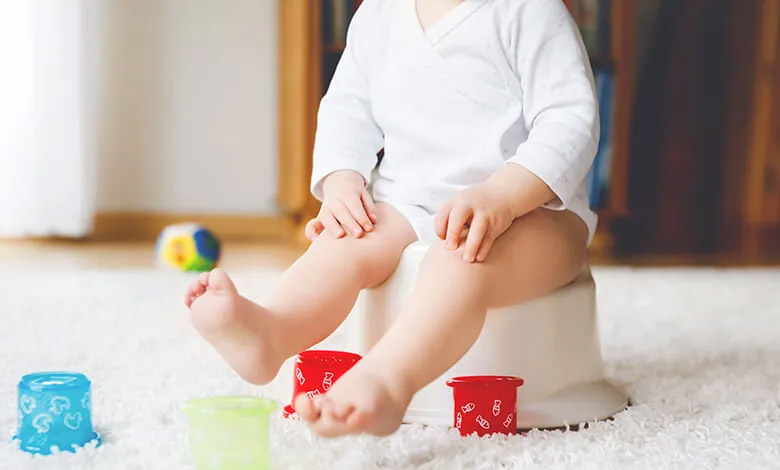- Constipation is common, affecting around 15% of babies under 12 months of age
- Baby poo varies a lot and depends on the baby’s diet
- For babies, infrequent poo doesn’t always mean constipation
- Constipation in an exclusively breastfed baby is rare
- If formula feeding, first ensure you are preparing the formula exactly as directed on the tin
- Speak to a healthcare professional about nutritional management solutions for your baby (specialty products should only be used under the supervision of a healthcare professional)
- If you have ongoing concerns about your baby’s poo, speak to your healthcare professional to discuss further
A guide to help manage your baby’s constipation

Key points
Trying to pass hard poos can be painful and uncomfortable for babies, just like it is for adults. Constipation in babies is common, with around 15% of babies occasionally becoming constipated. A baby’s digestive system is undergoing dramatic changes as they grow and it’s not unusual for them to occasionally experience an episode of constipation. The cause is typically dietary but may also be due to the immaturity of a baby’s growing digestive system. So, if your little one is finding it hard to poo, don’t worry too much as the symptoms of constipation are usually easy to spot and manage without medicines.
There is a big range in ‘normal’ baby poo
It is normal for a newborn baby’s first poo(s) to be a dark green, tar-like substance called meconium. After this, there’s a big range of ‘normal’ when it comes to the look, smell, and frequency of baby poo.
Some babies poo several times a day, and some poo only a few times a week. This is normal.
As your baby grows and develops, you can expect changes in poo, frequency, colour, consistency and smell.
Diet affects poo
The consistency, colour and smell of your baby’s poo will change as their digestive system and diet change. Although there is huge variability, here’s a general guide of what to expect from beyond their first five days:
- Breastfeeding – soft (even runny) consistency, mustard or yellow-orange but sometimes green, sweet smell.
- Breastfeeding + formula feeding – generally firmer consistency, yellow/yellow-green colour.
- Formula feeding – generally firmer consistency, dark yellow/brown colour.
- Solid foods – becomes firmer consistency and smellier, can look as if some solids are undigested (this is usually normal).
How often should babies poo?
There’s no set number of poos babies should do each day. Some babies poo a surprising number of times a day while others poo much less often. Infrequent pooing doesn’t always mean constipation. Your baby may go several days without a poo before easily passing a well-formed poo. As a general guide:
0–3 months~ 3–5 months~ 6+ months~
every 1-3 days 4 poos/day 6 poos/day
Constipation symptoms to look for
Constipation is when the poo is hard and dry and may look like little pebbles. This kind of poo is difficult for your baby to push out, which can be upsetting for your baby.
Constipation is more likely to happen in bottle-fed babies. It usually happens when the formula has been made with too little water.
Babies might also get constipated when they start solid food. This normally sorts itself out in a few weeks.
The symptoms of constipation in babies include infrequent poos, hard poos and/or difficulty or pain pooing. Other signs which could indicate constipation:
- Crying or looking distressed before doing a poo
- The poo or wind smells particularly bad
- Your baby starts to feed or eat less
- Their belly feels hard
If your baby is straining and pooing hard, dry pebbles or if you see blood in the poo, speak to your GP or your maternal and child health nurse.
TIP: Keeping a diary of your baby’s poo using the diapered infant stool scale will help you to provide useful information to your managing health care professional
How to help soothe your constipated baby
If your baby is having problems with painful, hard poos, these practical suggestions might help:
- Medications for infants with constipation are not recommended unless they’ve been prescribed or recommended by a healthcare professional.
- If you’re formula feeding, check that you’re making up the formula correctly and that you’re not adding too much powder or too little water. You can also speak to your healthcare professional about suitable specialist formulas for the dietary management of constipation.
- If your baby is on solids, offer extra water between meals. You can also try incorporating more pureed fruit and vegetables – stewed prunes and apricots can help.
- Try gently moving your baby’s legs in a cycling motion or massaging their tummy.
For more information, check out our 5 top tips to help manage constipation.
REMEMBER: If you have any concerns about your baby’s poo or questions about constipation, please speak to a healthcare professional, like a Pharmacist, GP or Maternal Child Health Nurse.
TIP: Keeping a diary of your baby’s poo using the diapered infant stool scale will help you to provide useful information to your managing health care professional.
- Vandenplas Y, Abkari A, Bellaiche M, Benninga M, Chouraqui JP, Çokura F, Harb T, Hegar B, Lifschitz C, Ludwig T, Miqdady M, de Morais MB, Osatakul S, Salvatore S, Shamir R, Staiano A, Szajewska H, Thapar N. Prevalence and Health Outcomes of Functional Gastrointestinal Symptoms in Infants From Birth to 12 Months of Age. J Pediatr Gastroenterol Nutr. 2015 Nov;61(5):531-7. doi: 10.1097/MPG.0000000000000949. Erratum in: J Pediatr Gastroenterol Nutr. 2016 Mar;62(3):516. PMID: 26308317; PMCID: PMC4631121.
- Vandenplas Y et al. Functional gastro-intestinal disorder algorithms focus on early recognition, parental reassurance and nutritional strategies. Acta Paediatr 2016;105:244-52.
- Tabbers MM et al. Evaluation and treatment of functional constipation in infants and children: evidence-based recommendations from ESPGHAN and NASPGHAN. J Pediatr Gastroenterol Nutr 2014;58:258- 74.
- raisingchildren.net.au, Constipation, The Australian Parenting Website. Accessed Dec 21, 2021.
- raisingchildren.net.au, Poos and wees, The Australian Parenting Website. Accessed Dec 21, 2021.
- The Royal Children’s Hospital Melbourne. Constipation. Kids Health Information : Constipation (rch.org.au). Accessed Dec 21, 2021.
- Gustin J, et al. Characterizing Exclusively Breastfed Infant Stool via a Novel Infant Stool Scale. JPEN; 2018: S5-S11.
Related pages

Get in touch with our Careline experts
When your little one is unhappy or unwell you want reliable support from a trusted source. Our Careline team of nutritionists, dietitians and midwives specialise in infant and child health, offering free nutrition, feeding and product information.
Every feeding journey is unique
Not every parent can produce breast milk. No matter what choice you make, we will support your unique feeding journey.
We at Nutricia believe in providing the best nutrition for babies, which is why we recognise breast milk is uniquely superior for babies as it provides many benefits. It is important that mums have a healthy diet to support breastfeeding. A decision not to breastfeed, or partial bottle feed, may reduce breast milk supply making it difficult to reverse. The cost and social implications of using feeding methods should be considered. Always seek professional advice about feeding your baby. Ensure formula is used as directed as improper use can affect baby’s health.
REMEMBER: The information on this page is general only. If you have any concerns about your baby’s poo or questions about constipation or any other health concerns, please speak to a healthcare professional, like a Pharmacist, GP or Maternal Child Health Nurse.



